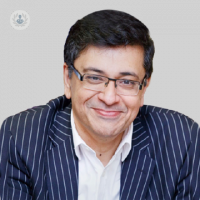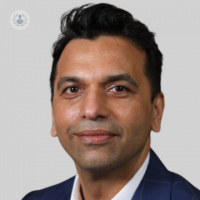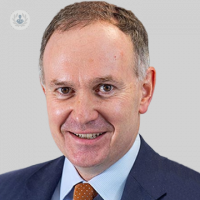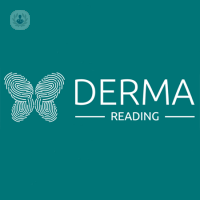What are cysts?
Cysts are closed sacs in the body’s tissue that may be filled with fluid, air, or other substances. They have a membrane, or “shell”, to divide them from the surrounding tissue, and the cells that make up this membrane are abnormal compared to the surrounding cells.
Cysts can appear almost anywhere on the body, including on bones, organs, and the skin. There are hundreds or types of cyst and many possible causes.
Most cysts are benign and some resolve on their own; others may require surgical removal and a small proportion are cancerous.
Types of cysts
There are many types of cyst, including:
- Cystic acne
- Ganglion cyst
- Ingrown hair cyst
- Kidney cysts (e.g. polycystic kidney disease (PKD))
- Liver cyst
- Mucus cyst (mucocele)
- Ovarian cyst
- Pancreatic cyst
- Sebaceous cyst
- Tarlov cyst
Prognosis
The vast majority of cysts are benign (non-cancerous) and cause few problems for the patients. Many cysts simply go away on their own. However, if a cyst fails to resolve by itself, if it is causing particular discomfort or pain, or if its size and appearance bother the patient, it may require surgical removal, although this may also depend on the location of the cyst in the patient’s body.
If a cyst becomes infected, it can become sore and red, and may develop into an abscess (filled with pus).
A small proportion of cysts are cancerous, with the sac being formed by the body as an immune response to try to contain the cancerous cells and prevent them from spreading. However, if the cancer already has its own blood supply, the cyst will be ineffective. It is important to have any cyst that does not disappear quickly checked out by a doctor and monitored to make sure it is not cancerous.
Cysts symptoms
Cysts on the skin or close to it may be visible as lumps on the body. Cysts on the internal organs may be more difficult to spot, unless they cause symptoms such as pain in that area or affect the function of the organ. For example, kidney cysts caused by polycystic kidney disease (PKD) can lead to frequent urination or blood in the urine.
What causes cysts?
A number of things can lead to cysts, including blocked ducts or glands, infections, inherited conditions, chronic inflammation, parasites, injuries, and tumours.
Treatments for cysts
The treatment will depend on the type, size, and location of the cyst. Some common treatments include:
- Draining the fluid or other material from the cyst using a syringe
- Medication to reduce inflammation in the cyst
- Surgery to remove the cyst (usually as a last resort for persistent cysts or if the cyst is cancerous)
Which type of specialist treats cysts?
Cysts can be treated by doctors and surgeons from a number of different specialties, depending on the type and location of the cyst. For example, sebaceous cysts and other cysts affecting the skin may be treated by a dermatologist, while ovarian cysts may be treated by an obstetrician/gynaecologist.
Quiste
What are cysts?
Cysts are closed sacs in the body’s tissue that may be filled with fluid, air, or other substances. They have a membrane, or “shell”, to divide them from the surrounding tissue, and the cells that make up this membrane are abnormal compared to the surrounding cells.
Cysts can appear almost anywhere on the body, including on bones, organs, and the skin. There are hundreds or types of cyst and many possible causes.
Most cysts are benign and some resolve on their own; others may require surgical removal and a small proportion are cancerous.
Types of cysts
There are many types of cyst, including:
- Cystic acne
- Ganglion cyst
- Ingrown hair cyst
- Kidney cysts (e.g. polycystic kidney disease (PKD))
- Liver cyst
- Mucus cyst (mucocele)
- Ovarian cyst
- Pancreatic cyst
- Sebaceous cyst
- Tarlov cyst
Prognosis
The vast majority of cysts are benign (non-cancerous) and cause few problems for the patients. Many cysts simply go away on their own. However, if a cyst fails to resolve by itself, if it is causing particular discomfort or pain, or if its size and appearance bother the patient, it may require surgical removal, although this may also depend on the location of the cyst in the patient’s body.
If a cyst becomes infected, it can become sore and red, and may develop into an abscess (filled with pus).
A small proportion of cysts are cancerous, with the sac being formed by the body as an immune response to try to contain the cancerous cells and prevent them from spreading. However, if the cancer already has its own blood supply, the cyst will be ineffective. It is important to have any cyst that does not disappear quickly checked out by a doctor and monitored to make sure it is not cancerous.
Cysts symptoms
Cysts on the skin or close to it may be visible as lumps on the body. Cysts on the internal organs may be more difficult to spot, unless they cause symptoms such as pain in that area or affect the function of the organ. For example, kidney cysts caused by polycystic kidney disease (PKD) can lead to frequent urination or blood in the urine.
What causes cysts?
A number of things can lead to cysts, including blocked ducts or glands, infections, inherited conditions, chronic inflammation, parasites, injuries, and tumours.
Treatments for cysts
The treatment will depend on the type, size, and location of the cyst. Some common treatments include:
- Draining the fluid or other material from the cyst using a syringe
- Medication to reduce inflammation in the cyst
- Surgery to remove the cyst (usually as a last resort for persistent cysts or if the cyst is cancerous)
Which type of specialist treats cysts?
Cysts can be treated by doctors and surgeons from a number of different specialties, depending on the type and location of the cyst. For example, sebaceous cysts and other cysts affecting the skin may be treated by a dermatologist, while ovarian cysts may be treated by an obstetrician/gynaecologist.


Bartholin cysts and abscesses: What are they, and how are they treated?
Por Mr Mahantesh Karoshi
2025-02-01
Ver más


Skin cysts – should I be worried?
Por Mr Alastair MacKenzie Ross
2025-02-01
Cysts can come in all shapes and sizes and can appear all over the body. What are these strange lumps? Should you be worried about them? What are the differences between them? Leading plastic surgeon Mr Alastair MacKenzie Ross lends us his insight into the world of skin cysts. Ver más


Epididymal cysts: When is surgery needed to remove growths in the scrotum?
Por Mr Mark Cynk
2025-02-01
An epididymal cyst is a fluid-filled growth that forms in the epididymis, the tube located on the upper testicle (in the scrotum). Although non-cancerous and generally painless, surgery for the removal of an epididymal cyst may be recommended. Mr Mark Cynk, highly experienced consultant urological surgeon, provides an expert insight into epididymal cyst surgery. Ver más
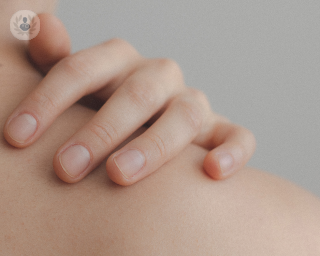

What are lipomas how can removed
Por Miss Sujatha Tadiparthi
2025-02-01
Lipomas are soft, painless lumps that grow slowly under the skin. While they don't normally cause any harm, they tend to grow larger and you may choose to have one removed to feel less self-conscious of the unsightly swelling. Miss Sujatha Tadiparthi, a leading plastic surgeon based in Surrey, Kent and London, explains what they are and what to expect when you undergo a lipoma removal procedure. Ver más
Doctores expertos en Quiste
-
Mr Ashfaq Khan
Ginecología y ObstetriciaExperto en:
- Colonoscopia
- Virus del papiloma humano (VPH)
- Resultado positivo de citología vaginal
- Ovarios poliquísticos
- Sangrado posmenopáusico
- Quiste
-
Mr Thomas Satyadas
Cirugía generalExperto en:
- Cirugía de la vesícula biliar
- Hernia
- Cáncer de hígado
- Cáncer de páncreas
- Cirugía de acceso mínimo (cirugía de ojo de cerradura)
- Quiste
-
Mr Patrick Gillespie
Cirugía plástica, estética y reparadoraExperto en:
- Verrugas
- Túnel carpiano
- Dupuytren's contracture
- Cáncer de piel
- Quiste
- Artrosis en las manos
-
Professor Julia Scarisbrick
DermatologíaExperto en:
- Cáncer de piel
- Linfoma
- Acné
- Diagnóstico cáncer de piel
- Quiste
- Nevus o lunares
-
Mr Deep J Malde
Cirugía generalExperto en:
- Cirugía de la vesícula biliar
- Cáncer de hígado
- Cáncer de páncreas
- Pancreatitis
- Quiste
- Tumores neuroendocrinos
- Ver todos

LINIA Skin Clinic
LINIA Skin Clinic
64 Harley St, London
No existe teléfono en el centro.
Si haces uso de este teléfono facilitado por TOP DOCTORS nos autorizas al tratamiento de tu teléfono para fines estadísticos y comerciales. Para más información, lee nuestra Política de Privacidad
Top Doctors

Derma Reading
Derma Reading
Shepherds Hill, Woodley, RG6 1FE
No existe teléfono en el centro.
Si haces uso de este teléfono facilitado por TOP DOCTORS nos autorizas al tratamiento de tu teléfono para fines estadísticos y comerciales. Para más información, lee nuestra Política de Privacidad
Top Doctors

108 Harley Street Medical
108 Harley Street Medical
108 Harley Street, W1G 7ET
No existe teléfono en el centro.
Si haces uso de este teléfono facilitado por TOP DOCTORS nos autorizas al tratamiento de tu teléfono para fines estadísticos y comerciales. Para más información, lee nuestra Política de Privacidad
Top Doctors
-
LINIA Skin Clinic
64 Harley St, London, Central LondonExperto en:
- Acné
- Dermatología estética
- Lesiones de la piel
- Perdida de cabello
- Rellenos faciales
-
Derma Reading
Shepherds Hill, Woodley, RG6 1FE, ReadingExperto en:
- Acné
- Cáncer de piel
- Dermatología pediátrica
- Lunares
- Medicina estética
- Perdida de cabello
-
108 Harley Street Medical
108 Harley Street, W1G 7ET, W1G Marylebone LondonExperto en:
- Angiología y Cirugía vascular
- Dermatología
- Diagnóstico por imagen
- La salud de la mujer
- Medicina del Deporte
- Rehabilitación
- Ver todos
